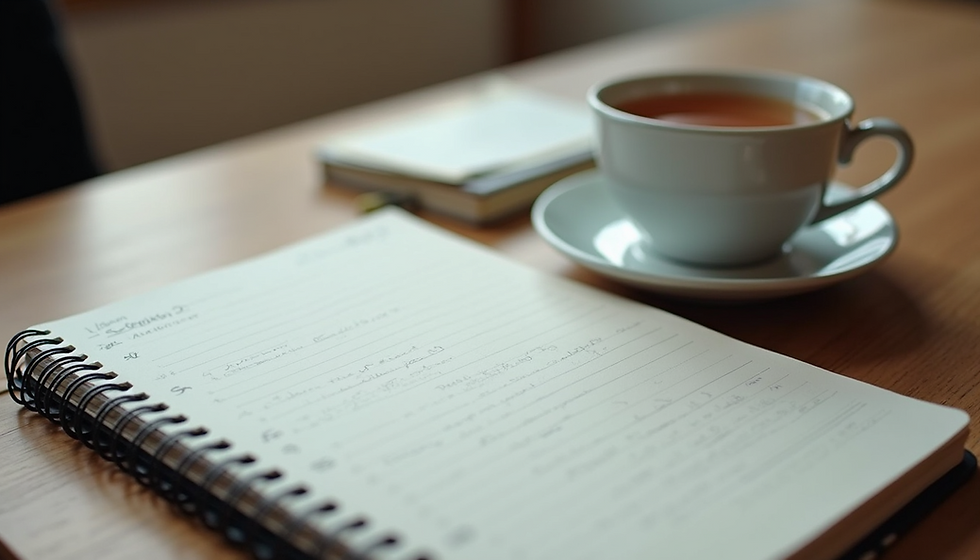How to Stay Organised and Maintain Wellbeing Every Day
- Jun 23, 2025
- 4 min read
In today's fast-paced world, staying organised and maintaining wellbeing has become crucial for success and happiness. We often juggle multiple responsibilities, whether it is work, family, or personal goals. The key to a fulfilling life lies in finding a balance. This article will provide practical tips and strategies you can implement every day to enhance your organisation and wellbeing.
Organisation and Wellbeing
Being organised can significantly improve your mental and physical wellbeing. When you have a clear plan and an uncluttered environment, you reduce stress and create space for creativity and productivity. Here are some effective strategies to cultivate both organisation and wellbeing.
Create a Daily Schedule
One of the best ways to stay organised is by developing a daily schedule. This can help you allocate time efficiently for work tasks, personal commitments, and relaxation.
Use Digital Tools: Applications like Google Calendar or Trello enable you to plan your day. You can set reminders and deadlines to ensure you stay on track.
Prioritise Tasks: Start by listing your tasks for the day and prioritising them. Use the Eisenhower Matrix to differentiate between urgent and important tasks, focusing on what truly matters.
Time Blocking: Allocate specific blocks of time for different tasks. For example, dedicate the first two hours of your day to focused work, then reserve some time for meetings, followed by breaks.

Declutter Your Space
An organised environment contributes to mental clarity. A clutter-free workspace helps you think more clearly and enhances creativity.
Decluttering: Start with your desk. Remove items that you do not use daily. A clean space promotes a clearer mind.
Organise Your Digital Files: Don’t forget about digital clutter. Organise files into folders and delete documents that are no longer needed.
Establish Zones: If you work from home, create distinct zones for work and relaxation. This separation can help you transition from one role to the other more smoothly.

What is the 888 Rule for Work-Life Balance?
The 888 rule is a simple yet effective framework for achieving work-life balance. This approach divides your day into three distinct segments of eight hours each.
Eight Hours of Work: Aim to work efficiently and avoid overworking. Recognise when your productivity dips and adjust your schedule accordingly.
Eight Hours of Leisure: This includes all personal time—hobbies, family, and relaxation. Engage in activities that bring you joy and rejuvenate your spirit.
Eight Hours of Sleep: Sleep is essential for physical and mental health. Prioritising rejuvenating sleep can improve concentration, memory, and mood.
Implementing the 888 rule can help you manage your time effectively, ensuring you devote sufficient attention to various aspects of life.
Establish Healthy Routines
Creating daily habits can significantly impact your organisation and wellbeing.
Morning Routine: Start each day with a structured morning routine. This could include exercise, breakfast, and meditation. Studies show that a positive morning can set the tone for a productive day.
Break Time: Schedule short breaks throughout your day. Techniques like the Pomodoro method (25 minutes of work followed by a 5-minute break) can help maintain focus and energy.
Evening Wind Down: Establish a calming night-time routine. Avoid screens an hour before bed and engage in relaxing activities like reading or journaling.

Mindfulness and Stress Management
Mindfulness practices can enhance your mental wellbeing and keep you organised in your thoughts.
Meditation: Spend a few minutes each day meditating. This practice can help reduce stress, improve concentration, and promote overall mental clarity.
Gratitude Journaling: Write down three things you are grateful for every day. This can shift your focus from stressors to positive aspects of life.
Breathwork: Practice deep breathing exercises when you feel overwhelmed. This simple technique can lower stress levels and refresh your mind.
Incorporating mindfulness can create a deeper sense of organisation within your thoughts and emotions.
Set Boundaries
Setting boundaries is crucial in maintaining your wellbeing. It helps you focus better and prevents burnout.
Work Hours: Clearly define when your work day starts and ends. When the workday is over, turn off work-related notifications and focus on personal time.
Say No: It's okay to decline additional responsibilities that do not align with your current goals or interests. This will free up time for things that matter to you.
Digital Detox: Limit screen time, especially on social media. Allocate specific hours for checking emails or browsing the internet.
By establishing boundaries, you ensure that your personal life does not suffer due to work commitments.
Foster Connections
Social connections can boost your mood and sense of happiness.
Connect with Family: Regular family activities, even simple dinners, maintain close relationships and foster happiness.
Join a Community: Participate in community activities, clubs, or groups that interest you. Building friendships through shared interests can positively influence your wellbeing.
Seek Support: Don’t hesitate to seek help when needed. Having someone to talk to during challenging times can provide comfort and new perspectives.
Staying connected with others enriches your life and aids in maintaining balance.
Final Thoughts on Organisation and Wellbeing
Maintaining organisation and prioritising your wellbeing is not just a task; it is a lifestyle choice. Implementing these strategies—like using the 888 rule for work-life balance, establishing healthy routines, and fostering connections—can significantly improve your daily life.
For more effective work-life balance tips, remember that small changes can lead to significant results. Start today and take one step towards a more organised and fulfilling daily routine. When you prioritise organisation and wellbeing, you pave the way for a happier, healthier life.













I used to get really bogged down with work, feeling overwhelmed. Prioritising my tasks has really been a life saver and makes me look at each day more positively.